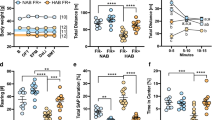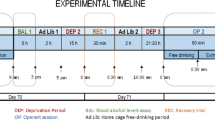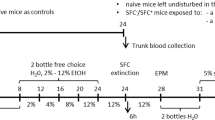Abstract
Rationale. Rats avidly consume standard off-the-shelf beer; however, the behavioural consequences of beer consumption in rodents have hardly been studied.
Objectives. The present study examined the acute anxiolytic and ataxic effects of beer consumption in rats and the anxiogenic effects of withdrawal from free access to beer.
Method. In experiment 1, male Wistar rats received 30 min access to "near-beer" each day (a malt beverage that looks and tastes like beer but which contains <0.5% ethanol). On the test day, for some rats, ethanol (either 2% or 4% v/v) was added to the near-beer to make it resemble standard (ethanol-containing) beer of "light" (2.5% beer) or full strength (4.5% beer). Immediately after this, rats were tested on their response to a predatory cue (a fabric collar that had been worn by a cat) and on an accelerating rotarod. In experiment 2, rats were trained in the same drinking paradigm as above and then tested on a further battery of anxiety tests. In experiment 3, rats were given continuous home cage access to either 4.5% beer or near-beer for 35 days. Half of the rats were then denied access to beer or near-beer for 24 h and then tested on the same anxiety test battery as in experiment 2.
Results. Rats drinking 4.5% beer approached a predatory cue significantly more than those given near-beer, indicating an anxiolytic effect. In experiment 2, rats drinking 4.5% beer displayed less anxiety-like behaviour in the elevated plus maze and emergence tests but not in the social interaction test. Rats given 4.5% beer fell off the rotarod significantly faster than rats given near-beer, indicating an ataxic effect. Rats previously given 4.5% beer drank significantly less near-beer the following day, suggesting a moderate aversion the day after beer consumption. In experiment 3, rats denied access to 4.5% beer showed significantly less social interaction and took longer to emerge into an open field than controls.
Conclusion. These results are the first to our knowledge to show that rats will consume beer at levels that produce clear effects on anxiety and on motor co-ordination, and that will eventually produce behavioural signs of withdrawal.
Similar content being viewed by others
Author information
Authors and Affiliations
Additional information
Electronic Publication
Rights and permissions
About this article
Cite this article
Gallate, J.E., Morley, K.C., Ambermoon, P. et al. The consequences of beer consumption in rats: acute anxiolytic and ataxic effects and withdrawal-induced anxiety. Psychopharmacology 166, 51–60 (2003). https://doi.org/10.1007/s00213-002-1291-z
Received:
Accepted:
Issue Date:
DOI: https://doi.org/10.1007/s00213-002-1291-z




